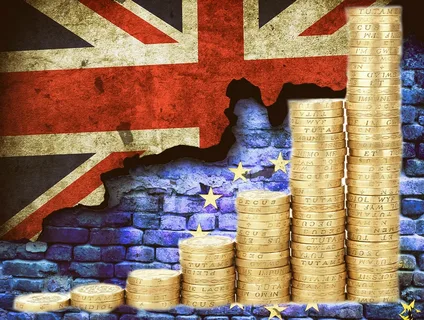The current state of the UK economy is marked by several significant factors that are shaping its recovery trajectory. One of the most pressing issues is inflation. Inflation impacts UK economic recovery in multifaceted ways. The rising prices of goods and services reduce the purchasing power of consumers, leading to decreased consumer spending. This reduction in spending can slow down economic growth as businesses experience lower sales volumes, which in turn can lead to reduced investments and potential job cuts. Additionally, inflation can increase the cost of borrowing, making it more expensive for businesses and individuals to take out loans for investment or consumption. The Bank of England often responds to inflation by adjusting interest rates, which can have further implications for economic recovery.
Employment rates also play a crucial role in the current state of the UK economy and its recovery prospects. Employment rates affect UK economic recovery by influencing household incomes and consumer confidence. High employment rates generally lead to higher disposable incomes, which can boost consumer spending and drive economic growth. Conversely, high unemployment rates can lead to reduced consumer spending, as households tighten their budgets in response to job insecurity or loss of income. The employment landscape in the UK has been significantly impacted by both the COVID-19 pandemic and Brexit, with certain sectors experiencing more pronounced job losses or hiring difficulties. Addressing employment challenges is therefore essential for a robust economic recovery.
Government Initiatives and Policies

In response to the economic challenges posed by the COVID-19 pandemic, the UK government has introduced several initiatives aimed at fostering economic recovery. Government initiatives for UK economic recovery post-pandemic include measures such as the furlough scheme, which provided financial support to businesses to retain employees during periods of reduced economic activity. Additionally, the government has implemented various grants and loan schemes to support businesses, particularly small and medium-sized enterprises (SMEs), in navigating the financial difficulties brought about by the pandemic. These initiatives have been crucial in stabilizing the economy and preventing widespread business closures and job losses.
Policies focusing on sustainable UK economic recovery are also a key component of the government’s strategy. The government has emphasized the importance of building a greener, more resilient economy as part of its recovery plan. This includes investments in renewable energy, green technologies, and infrastructure projects that promote sustainability. By prioritizing sustainable growth, the government aims to create long-term economic stability and address environmental challenges simultaneously. Such policies not only contribute to economic recovery but also position the UK as a leader in the global transition to a low-carbon economy.
Challenges Facing Economic Recovery
The path to economic recovery in the UK is not without its challenges. One significant factor is the impact of Brexit. Brexit impacts UK economic recovery by introducing uncertainties and disruptions in trade, investment, and labor markets. The UK’s departure from the European Union has led to changes in trade relationships, with new tariffs and regulatory requirements affecting the flow of goods and services. Businesses that rely on cross-border trade have had to navigate these new complexities, which can increase costs and reduce competitiveness. Additionally, the end of free movement has implications for the labor market, particularly in sectors that have traditionally relied on EU workers. Addressing these challenges is crucial for ensuring a smooth economic recovery.
The COVID-19 pandemic’s long-term effects on UK economic recovery are also a major concern. The pandemic has caused significant disruptions to economic activity, leading to business closures, job losses, and changes in consumer behavior. Even as the immediate health crisis subsides, the long-term economic effects of the pandemic are likely to persist. These include potential shifts in the structure of the economy, such as increased remote working and changes in consumer preferences. The pandemic has also highlighted and exacerbated existing inequalities, which could pose additional challenges to recovery efforts. Developing strategies to address these long-term effects is essential for a comprehensive economic recovery.
Role of the Private Sector
The private sector plays a vital role in boosting the UK’s economic recovery. Private sector investment boosts UK economic recovery by driving innovation, creating jobs, and stimulating economic activity. Investments in new technologies, infrastructure, and business expansion can lead to increased productivity and competitiveness. The private sector’s ability to adapt to changing market conditions and seize new opportunities is crucial for economic growth. Encouraging private sector investment through favorable policies and incentives can help accelerate the recovery process and create a more dynamic and resilient economy.
Innovation in the private sector drives UK economic recovery by fostering new products, services, and business models that meet evolving consumer needs and preferences. The development and adoption of innovative solutions can enhance efficiency, reduce costs, and open up new markets. For example, advancements in digital technologies have enabled businesses to operate more effectively and reach a wider audience. By supporting innovation, the UK can position itself as a leader in emerging industries and drive long-term economic growth. Collaboration between the private sector, government, and research institutions is key to unlocking the full potential of innovation for economic recovery.
Impact of Global Economic Trends
Global economic trends have a significant influence on the strategies and policies adopted for the UK’s economic recovery. Global trends influence UK economic recovery strategies and policies by shaping the external environment in which the economy operates. For instance, trends such as globalization, technological advancements, and shifts in consumer behavior can create both opportunities and challenges for the UK. Policymakers must consider these trends when developing recovery plans to ensure that the UK remains competitive in the global market. Adapting to global trends can help the UK capitalize on new growth areas and mitigate potential risks.
The UK’s economic recovery also depends on international trade and investment trends. Trade relationships and foreign investments are critical components of the UK’s economic landscape. The ability to attract foreign investment and maintain strong trade partnerships can significantly impact economic recovery efforts. Changes in global trade dynamics, such as shifts in supply chains or trade policies, can affect the UK’s export and import activities. Ensuring that the UK remains an attractive destination for international trade and investment is essential for sustaining economic growth and recovery. This requires a proactive approach to trade negotiations and investment promotion.
Opportunities for Growth and Innovation
Despite the challenges, there are several opportunities for growth and innovation that can support the UK’s economic recovery. Investment in green technologies for UK Economic recovery is one such opportunity. The transition to a low-carbon economy presents significant growth potential, with opportunities to develop and deploy renewable energy sources, energy-efficient technologies, and sustainable practices. Investing in green technologies can create new industries and jobs, reduce environmental impact, and enhance energy security. By prioritizing green investments, the UK can drive economic recovery while addressing climate change and positioning itself as a leader in the global green economy.
Boosting digital infrastructure to support UK economic recovery is another key opportunity. The COVID-19 pandemic has accelerated the adoption of digital technologies, highlighting the importance of robust digital infrastructure. Enhancing digital connectivity, such as expanding high-speed internet access and investing in digital skills, can support business innovation, remote working, and access to digital services. Improved digital infrastructure can also facilitate the growth of the digital economy, enabling businesses to reach new markets and customers. By investing in digital infrastructure, the UK can create a more inclusive and resilient economy that is well-equipped for future challenges.
Future Economic Projections and Scenarios

The future of the UK’s economic recovery hinges on several factors, including sustainable fiscal policies. UK economic recovery hinges on sustainable fiscal policies that balance the need for economic stimulus with long-term fiscal responsibility. Effective fiscal policies can support economic growth by providing targeted support to businesses and households, investing in infrastructure, and promoting innovation. However, it is also important to manage public debt levels and ensure that fiscal measures are sustainable in the long term. Policymakers must strike a balance between immediate recovery needs and long-term fiscal health to create a stable economic environment.
Future economic scenarios also depend on post-Brexit trade agreements. The nature of the UK’s trade relationships with the EU and other countries will have significant implications for economic recovery. Trade agreements that facilitate smooth and efficient trade can support economic growth by reducing barriers and increasing market access. Conversely, trade disruptions or unfavorable agreements could pose challenges to recovery efforts. The UK must navigate the complexities of post-Brexit trade negotiations to secure agreements that promote economic stability and growth. The outcomes of these negotiations will shape the future economic landscape and influence recovery trajectories.
Conclusion:
In conclusion, the path ahead for the UK’s economic recovery involves addressing current challenges, leveraging opportunities for growth and innovation, and adopting sustainable policies. The interplay of domestic and global factors will shape the recovery process, requiring a coordinated and adaptive approach from both the public and private sectors. By focusing on sustainable growth, innovation, and strategic trade relationships, the UK can pave the way for a resilient and prosperous economic future.










